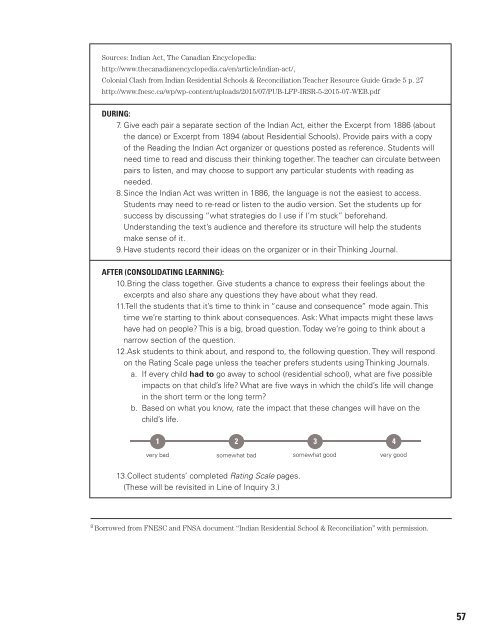Residential Residential
Residential_School
Residential_School
Create successful ePaper yourself
Turn your PDF publications into a flip-book with our unique Google optimized e-Paper software.
Sources: Indian Act, The Canadian Encyclopedia:<br />
http://www.thecanadianencyclopedia.ca/en/article/indian-act/,<br />
Colonial Clash from Indian <strong>Residential</strong> Schools & Reconciliation Teacher Resource Guide Grade 5 p. 27<br />
http://www.fnesc.ca/wp/wp-content/uploads/2015/07/PUB-LFP-IRSR-5-2015-07-WEB.pdf<br />
DURING:<br />
7. Give each pair a separate section of the Indian Act, either the Excerpt from 1886 (about<br />
the dance) or Excerpt from 1894 (about <strong>Residential</strong> Schools). Provide pairs with a copy<br />
of the Reading the Indian Act organizer or questions posted as reference. Students will<br />
need time to read and discuss their thinking together. The teacher can circulate between<br />
pairs to listen, and may choose to support any particular students with reading as<br />
needed.<br />
8. Since the Indian Act was written in 1886, the language is not the easiest to access.<br />
Students may need to re-read or listen to the audio version. Set the students up for<br />
success by discussing “what strategies do I use if I’m stuck” beforehand.<br />
Understanding the text’s audience and therefore its structure will help the students<br />
make sense of it.<br />
9. Have students record their ideas on the organizer or in their Thinking Journal.<br />
AFTER (CONSOLIDATING LEARNING):<br />
10.Bring the class together. Give students a chance to express their feelings about the<br />
excerpts and also share any questions they have about what they read.<br />
11.Tell the students that it’s time to think in “cause and consequence” mode again. This<br />
time we’re starting to think about consequences. Ask: What impacts might these laws<br />
have had on people? This is a big, broad question. Today we’re going to think about a<br />
narrow section of the question.<br />
12.Ask students to think about, and respond to, the following question. They will respond<br />
on the Rating Scale page unless the teacher prefers students using Thinking Journals.<br />
a. If every child had to go away to school (residential school), what are five possible<br />
impacts on that child’s life? What are five ways in which the child’s life will change<br />
in the short term or the long term?<br />
b. Based on what you know, rate the impact that these changes will have on the<br />
child’s life.<br />
1 2 3 4<br />
very bad somewhat bad somewhat good very good<br />
13.Collect students’ completed Rating Scale pages.<br />
(These will be revisited in Line of Inquiry 3.)<br />
8<br />
Borrowed from FNESC and FNSA document “Indian <strong>Residential</strong> School & Reconciliation” with permission.<br />
57


